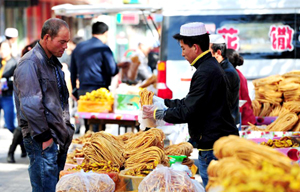
Such gigantic grain reserves need the best grain storage technology and smart grain warehouses.
"To handle price fluctuations, it's necessary to raise our security coefficient a little bit," Zhao said.
Founded in 2000 with a registered capital of 16.7 billion yuan (about 2.7 billion U.S. dollars), Sinograin has grown into one of the largest and most wide ranging grain storage and transportation companies.
Now heavily dependent on imports for cooking oil, China is seeking to reduce its exposure to price fluctuations on global markets. The grain self-sufficiency rate stood above 97 percent in 2013 and cereal imports reached only 14 million tonnes, accounting for less than 2.6 percent of cereal output.
Grain output expanded 2.1 percent year on year to over 600 million tonnes last year, the 10th year in a row of increased grain production.
Soybean remains the primary grain import, which rose 8.6 percent year on year to reach 63.4 million tonnes in 2013.

China's top 10 foodie cities |

Cute boxed meals |

Muslims greet annual festival of Eid al-Adha in Yinchuan |

Cafe Noir hosts Singapore food festival |

7 hot drinks to make Christmas merrier |

Sleep in a snow hotel |

Pastry Paradise exhibition opens in London |

Kids Rock the Kitchen with Chopsticks & Beyond |